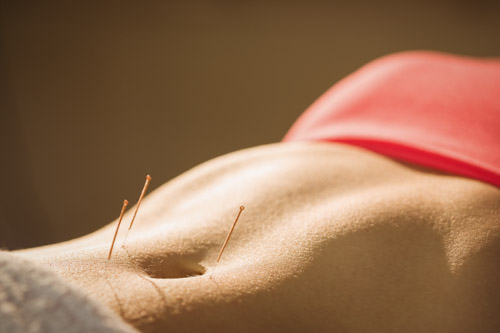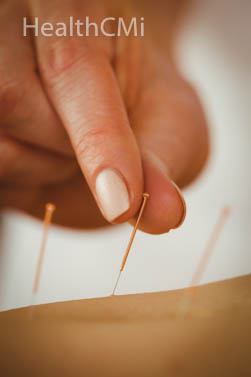Acupuncture and Chinese herbs prevent infertility after emergency ectopic pregnancy surgery. Ectopic pregnancies occur when a fertilized egg does not implant in the uterus.  A common form of ectopic pregnancy is a tubal pregnancy wherein the fertilized egg remains in one of the fallopian tubes. The fertilized egg cannot survive. It is a life-threatening condition that may require emergency surgery or an injection of methotrexate to stop cell growth. Unfortunately, this may lead to residual blockage of the fallopian tubes and subsequent infertility.
A common form of ectopic pregnancy is a tubal pregnancy wherein the fertilized egg remains in one of the fallopian tubes. The fertilized egg cannot survive. It is a life-threatening condition that may require emergency surgery or an injection of methotrexate to stop cell growth. Unfortunately, this may lead to residual blockage of the fallopian tubes and subsequent infertility.
Researchers from the Fudan University Obstetrics and Gynecology Hospital tested the benefits of acupuncture for patients receiving emergency ectopic pregnancy surgery. A ruptured fallopian tube or heavy bleeding necessitates surgical intervention. Laparoscopic surgery often involves a salpingectomy, which is surgical removal of a fallopian tube. The fallopian tube may be left intact after repair but salpingostomy procedures to restore tubal patency may not be adequate to prevent blockages and consequent infertility. After careful clinical trials, the Fudan University Obstetrics and Gynecology Hospital University researchers conclude that acupuncture combined with herbal medicine improves tubal patency and reduces the mass of fallopian tube obstructions.
The researchers compared two groups of patients. Each group received ectopic pregnancy surgery. One group also had acupuncture treatments and herbal medicine. Hysterosalpingography (HSG) imaging and ultrasonography confirm that acupuncture and herbal medicine promote tubal patency by reducing masses in the fallopian tubes.

This confirms the research of both Yan et al. and Wang et al. Yan et al. used acupuncture points Guilai (ST29), Zhongji (CV3), Shuidao (ST28), Zigong, and Sanyinjiao (SP6) to treat salpingitis obstructive infertility and achieved a 93.3% total effective rate. Wang et al. conclude that warm needle acupuncture decreases the recurrence of ectopic pregnancies after surgery for the treatment of complications from chronic pelvic inflammatory disease.
The Fudan University Obstetrics and Gynecology Hospital researchers achieved their clinical successes using both acupuncture and herbal medicine in a combined protocol. The herbal formula Gong Wai Yun #2 was prescribed for oral ingestion and included the following primary herbs:
- Dan Shen
- Chi Shao
- Tao Ren
- San Leng
- E Zhu
- Tian Hua Fen
- Gan Cao
Warm needle acupuncture was administered. The acupuncture treatments were given starting on the second week following the ectopic pregnancy operation. Total needle retention time per session was 30 minutes. Acupuncture was administered once per day for three weeks. Warm needle techniques were added after the elicitation of deqi. The primary acupuncture points were:
- CV6, Qihai
- CV4, Guanyuan
- SP6, Sanyinjiao
- SP9, Yinlingquan
Hysterosalpingograms (HSGs) demonstrate that fallopian tubes in the acupuncture and Chinese herbs group were more open and unblocked in comparison with the control group that received the same operation but did not received acupuncture or herbs. The findings demonstrate that the acupuncture and herbal medicine protocol prevents tubal factor infertility. Further, the findings indicate that acupuncture and herbal medicine may be an important part of any recovery protocol for women receiving emergency surgery for an ectopic pregnancy.
The Healthcare Medicine Institute provides both written and video courses online for acupuncture CEUs and PDAs on the topic of fertility and prevention of fallopian tube inflammation and obstruction. The course PID and Chinese Medicine focuses on acupuncture and herbal medicine for the elimination of pelvic inflammatory disease, a major contributing factor to fallopian tube obstructions and infertility. There are many other courses on this and related topics at HealthCMi.
References:
Li XR, Zhang GF, Zhang MW, Chang CF & Zhang D. (2014). Clinical Observations on the Effect of Combined Treatment with Acupuncture and Medicine on Tubal Patency after Ectopic Pregnancy Surgery. Shanghai Journal of Acupuncture and Moxibustion. 33(9).
Chen JX & Zhang XM. (2014). Oviduct pregnancy mechanism research. International Journal of Obstetrics and Gynecology. 41(1): 36.
Wang Y, Yao YQ, Ji XL, et al. (2009). Warm acupuncture on Taichong and Ren meridians in treating recurrent pelvic inflammatory disease. JiLin TCM. 29(6): 499-500.
Yan XL, Zou W & Sun XW. (2012). Acupuncture-moxibustion in the treatment of salpingitis obstructive infertility after abortion. Journal of Clinical Acupuncture. 28(2): 15-17.


